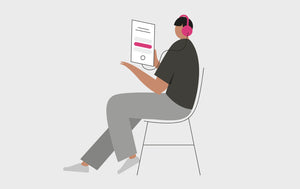Selective Hearing
Why it might not just be ‘selective hearing’
Have you ever found yourself accusing a friend or relative of having ‘selective hearing’ when they seem to purposefully tune out when you’re speaking to them? If you have done so recently - and on more than one occasion - it could be time to explore whether there is actually something more serious at play, and whether they might benefit from some assistance with their hearing. Here, Bev Carter RHAD, Senior Hearing Aid Audiologist at Hearing Direct, explains how age-related hearing loss can be confused with selective hearing and what to do if you suspect a loved one could require some support.
What is selective hearing?
Some research shows selective hearing is a true capability in which a person is able to tune into a single source of noise and block out others. However, the phrase is most often used in a casual way or as a joke, by people who have noticed their loved ones are missing out on key elements of a conversation or are struggling to hear in their daily life. But if you’re noticing that a relative or friend doesn’t always hear everything or is missing out on details in conversations, it could be the first sign that they’re experiencing age-related hearing loss.
Why does age-related hearing loss happen?
Age-related hearing loss occurs naturally, as tiny fibres in your ears become prone to wear and tear over time. Deep within our hearing system, we have tiny hairs that interpret soundwaves as they enter the ear and send messages to the brain. The hairs that pick up the higher frequencies are the most prone to wear and tear, as these are the first to pick up the soundwaves coming in. Damage to these hairs over time results in lack of speech clarity.
What are the signs of age-related hearing loss?
You might notice signs of age-related hearing loss when you are in a group situation and notice that a loved one is struggling to follow conversations, or if they are particularly hard of hearing when there is any background noise. Many people also find their relatives asking them to turn the TV up louder than they used to, which can be an indicator that their hearing has changed.
These common signs are often confused with people being accused of selective hearing, when the reality is something completely unavoidable has occurred. Fortunately, there are plenty of devices available now that can assist, and which can help to return hearing to normal levels.
What can be done to help?
The first step to take if you are noticing signs of hearing loss is to encourage your friend or relative to book a hearing test and get it checked out by an expert. This can be a delicate conversation, so there are things you can do to prepare yourself before introducing the conversation.
If you do decide to introduce the topic with your loved one, you might find they are either defensive or perhaps in denial and brush it off as a normal part of getting older. If this is the case, explain to them that there are free, quick and easy hearing checks available online, which means they can get a check-up without even having to leave the comfort of their own home and without spending any money.
Depending on the outcome of the check, they could then arrange to be seen for a face-to-face consultation with an expert, or they could consider whether it is time to invest in some simple hearing devices that can help to rectify the issues. Hearing aids, TV listeners and assistive listening devices are among the most popular options for those experiencing age-related hearing loss.
When bringing hearing loss up with your loved one, you might find it helpful to explain that there are now hundreds of more subtle and delicate hearing devices on offer compared with the classic, traditional hearing aids that they may be picturing. Plus, with more people than ever wearing hearing devices, there is far less social stigma associated with investing in devices that can assist with your hearing and there has never been a better time to start exploring the options.


